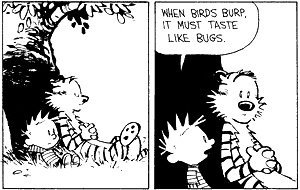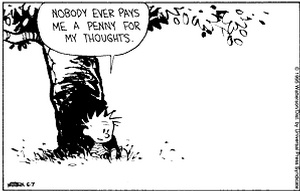
 Faith is not blind in Buddhism, but developed through one’s own experience. Emotionally, faith is experienced as doubt, just as courage is experienced emotionally as fear. When one’s doubt is greatest, one’s faith is most tested, and when one’s fear is greatest, one’s courage is most tested.
Faith is not blind in Buddhism, but developed through one’s own experience. Emotionally, faith is experienced as doubt, just as courage is experienced emotionally as fear. When one’s doubt is greatest, one’s faith is most tested, and when one’s fear is greatest, one’s courage is most tested.Ordinarily, faith and doubt are related to one another in inverse proportion: where faith is strong, doubt is weak; and vice versa. But in Zen practice, the greater the doubt, the greater the faith. Great Faith and Great Doubt are two aspects of the same mind of awakening (bodaishin).
The kind of doubt that exists in inverse proportion to faith is what we term insidious doubt - anxieties and suspicions based on craving, fear and confusion. In Buddhism, Great Doubt is of the "don’t-know-mind" variety, rather than insidious doubt which is projected upon others, and fended off with philosophies and beliefs.
The kind of doubt that arises in the "don't-know-mind" of Zen is the tip of the iceberg of Great Doubt, in which all belief or opinion is ultimately called into question, including those of nihilism on the one extreme, and god, savior and eternalism on the other. The great Middle Way is the resolution of such niggling doubt in direct experience, to which the most direct vehicle is zazen.
In Great Doubt and Great Faith, as one increases, so does the other. But insidious doubt eats away at faith like a cancer, and as insidious doubt increases, faith decreases. Similarly, blind faith takes over mundane doubt, and as blind faith increases, mundane doubt decreases.
Insidious doubt also relies on the ego-self as the ultimate authority. This state of mind is the polar opposite of "don’t-know-mind," and the ego-self relies solely on its own understanding. "I know what’s going on," the ego-self tells us, but that ego-self is itself a delusion, and the insidious doubt built upon a delusion is just piling error on top of error.
We must have the courage to continue in spite of insidious doubt; doubt in the Teaching, doubt in the teacher, doubt in our own buddha-nature; recognizing that it is primarily a defensive mechanism of the small self.

1 comment:
Excellent! I particularly like "Insidious doubt also relies on the ego-self as the ultimate authority." It's a good way to explain why "Great Doubt" is a virtue in Buddhism and "skeptical doubt" is considered a weakness. I often say that knowledge is having the right answers, and wisdom is asking the right questions. When we get ego out of the way, we have easy access to the right questions, Great Faith and Great Doubt.
Post a Comment